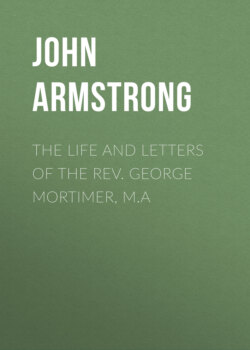Читать книгу The Life and Letters of the Rev. George Mortimer, M.A - John Armstrong - Страница 21
На сайте Литреса книга снята с продажи.
TO A YOUNG LADY.
ОглавлениеTable of Contents
Wellington, August 13th, 1812.
You have my condolence, my dear Miss—in not being able to attend the kind of ministry you approve of. Most individuals have a turn of mind, a peculiarity of thinking, which, in a great measure, may be considered as their own; and hence it should seem advisable that when the choice rests on ourselves, we should attend that ministry which comes nearest to our own case and circumstances. But, alas! this privilege is seldom allotted us; local situation, parental restraints, and a variety of other things, render it in general necessary to attend some place or other, which is not, perhaps, in every view, that which, if left to ourselves, we would have fixed upon. The question, then, is merely this—ought we, under the circumstances, to quarrel with the dispensations of providence, or quietly and patiently submit, endeavouring to extract from existing circumstances all the good we possibly can? The language of wisdom, as well as of piety, seems to direct to the latter course, as that best calculated to promote our present comfort, and future welfare. God has certainly some wise end or other to answer in every thing of this nature, and if we recollect, at the same time, how tenderly he loves us, how much he desires our spiritual improvement, as well as our eternal felicity, we shall rest so completely satisfied that we shall not have a single desire to alter in the minutest particular. But we are too apt to lose sight of the wisdom and love of God, as connected with our affairs, we listen to the suggestions of Satan, and fondly imagine that if we had the disposal of things we could easily regulate our concerns, so as to make them more effectually conduce to our welfare. How presumptuous is such language, when stripped of its false colouring, and presented under its real and proper appearance.
On the 30th November, 1812, he writes to his sister—I think that I mentioned in my last that there was an increase of congregation, and that I could discover some traces of the operation of the Spirit of God in applying the word. These effects, I gratefully acknowledge, are still to be seen, and it has pleased God to encourage me by bringing to my knowledge two instances in which I hope a decided and saving change has been produced—one on a lady of respectability in an adjoining parish, and the other on an individual among the lower circles.
On the 11th January, 1813, he writes to the same, on the birth of his eldest son;—I feel grateful to God for his goodness and mercy, as manifested on the present occasion, and I am cheered with a pleasing hope that the deposit which has this day been placed in my hands, will become an heir of immortality, a glory to his God, and an instrument of good to all around him. He has been the subject of my prayers for some time past, and I feel persuaded that God will not disappoint my hope. I, and its dear mother, feel anxious on its account, but what is our solicitude concerning him compared with that of the dear Redeemer! How kindly is he interested in his welfare; how ardently does he long to see in him of the travail of his soul that he may be satisfied! What encouragement does this consideration afford to the exercise of patient hope and persevering prayer.
And on the 24th of the following month, he wrote in reference to the baptism of the infant. We hope, should all be well, on this day se’nnight, to devote our little charge to his gracious God in baptism. I feel it to be a solemn occasion, for I cannot but think that much, both of its future happiness and usefulness, may depend on the manner in which it is thus surrendered. I am somewhat apprehensive that we shall not quite please you with respect to the name which we think of giving it. But it has long struck me as being a foolish custom which prevails at present of giving those names by way of distinction, which, in fact, owing to their commonness, are no distinction at all. George, Thomas, Henry, John, are used from generation to generation, and thus individuals are incessantly mistaken and confounded either for other. We have, therefore, ventured to step out of the beaten track, and have accordingly fixed upon Cecil, as one which, from many pleasing associations, has become endeared to both of us.
